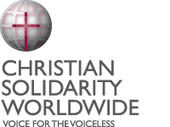
Christian Solidarity Worldwide (CSW) urged the British Government to ensure that continuing grave violations of human rights, including freedom of religion or belief, are put at the heart of discussions with Burma’s President Thein Sein during his visit to the United Kingdom next week.
President Thein Sein is expected to arrive in London for a two-day official visit on 14 July and will meet the Prime Minister, David Cameron, and the Foreign Secretary, William Hague. It is the first time a Burmese President has visited the UK in decades and is in recognition of the political reforms Thein Sein’s government has introduced over the past two years. It follows the UK visit in June 2012 of the leader of Burma’s democracy movement, Nobel Peace Prize Laureate Daw Aung San Suu Kyi, and a visit last month by leaders of the 88 Generation Student Movement.
President Thein Sein is expected to arrive in London for a two-day official visit on 14 July and will meet the Prime Minister, David Cameron, and the Foreign Secretary, William Hague. It is the first time a Burmese President has visited the UK in decades and is in recognition of the political reforms Thein Sein’s government has introduced over the past two years. It follows the UK visit in June 2012 of the leader of Burma’s democracy movement, Nobel Peace Prize Laureate Daw Aung San Suu Kyi, and a visit last month by leaders of the 88 Generation Student Movement.
Since Thein Sein became President in 2011, significant changes have been implemented, including the release of many political prisoners, the establishment of preliminary ceasefires with most of Burma’s ethnic armed resistance organizations, improvements in freedom of expression, including greater freedom for the media and increased space for civil society and political participation. In April 2012, Daw Aung San Suu Kyi and 42 members of the National League for Democracy (NLD) were elected to Parliament in by-elections. Both Daw Aung San Suu Kyi and Thein Sein have undertaken several overseas visits, including to Europe and the United States, since then.
However, in the past year a campaign of hate speech and violence against Muslims has swept the country, following two waves of violence against the Muslim Rohingya people in Arakan State in June and October last year, killing thousands and displacing over 130,000. In predominantly Christian Kachin State the Burma Army has continued its military offensive, resulting in the displacement of over 100,000 civilians, the destruction of at least 200 villages and 66 churches. Rape, forced labor, torture and killing of civilians continue to be widespread. In Chin State, reports of religious discrimination and persecution against Christians continue. In May, CSW released a report following a visit to Burma which included interviews with internally displaced people in Kachin State and victims of recent anti-Muslim violence. CSW has also worked closely with the Chin Human Rights Organization (CHRO) to highlight the situation in Chin State.
CSW’s Chief Executive Mervyn Thomas said, “While we welcome the positive changes which Thein Sein’s government has introduced, we are deeply concerned that there is a mood of premature euphoria among some in the international community in regard to Burma and a rush to prioritize trade relations at the expense of human rights. Since Thein Sein became President, religious intolerance and violence against Muslims in many parts of the country has escalated sharply, there are continuing violations of freedom of religion or belief in Chin State and the Burma Army ended a 17-year ceasefire in Kachin State, unleashing a major military offensive resulting in widespread and serious human rights violations. We urge the Prime Minister and the Foreign Secretary to ensure that human rights concerns are at the heart of discussions with Thein Sein and to deliver clear messages regarding the need to stop the spread of religious and ethnic hatred, intolerance and violence, to ensure release of all remaining political prisoners and to facilitate constitutional reform. If these benchmarks are not met before the next elections in Burma, due in 2015, there should be consequences for the Government of Burma and its relations with the international community, and Britain must make that clear.”
However, in the past year a campaign of hate speech and violence against Muslims has swept the country, following two waves of violence against the Muslim Rohingya people in Arakan State in June and October last year, killing thousands and displacing over 130,000. In predominantly Christian Kachin State the Burma Army has continued its military offensive, resulting in the displacement of over 100,000 civilians, the destruction of at least 200 villages and 66 churches. Rape, forced labor, torture and killing of civilians continue to be widespread. In Chin State, reports of religious discrimination and persecution against Christians continue. In May, CSW released a report following a visit to Burma which included interviews with internally displaced people in Kachin State and victims of recent anti-Muslim violence. CSW has also worked closely with the Chin Human Rights Organization (CHRO) to highlight the situation in Chin State.
CSW’s Chief Executive Mervyn Thomas said, “While we welcome the positive changes which Thein Sein’s government has introduced, we are deeply concerned that there is a mood of premature euphoria among some in the international community in regard to Burma and a rush to prioritize trade relations at the expense of human rights. Since Thein Sein became President, religious intolerance and violence against Muslims in many parts of the country has escalated sharply, there are continuing violations of freedom of religion or belief in Chin State and the Burma Army ended a 17-year ceasefire in Kachin State, unleashing a major military offensive resulting in widespread and serious human rights violations. We urge the Prime Minister and the Foreign Secretary to ensure that human rights concerns are at the heart of discussions with Thein Sein and to deliver clear messages regarding the need to stop the spread of religious and ethnic hatred, intolerance and violence, to ensure release of all remaining political prisoners and to facilitate constitutional reform. If these benchmarks are not met before the next elections in Burma, due in 2015, there should be consequences for the Government of Burma and its relations with the international community, and Britain must make that clear.”


 RSS Feed
RSS Feed